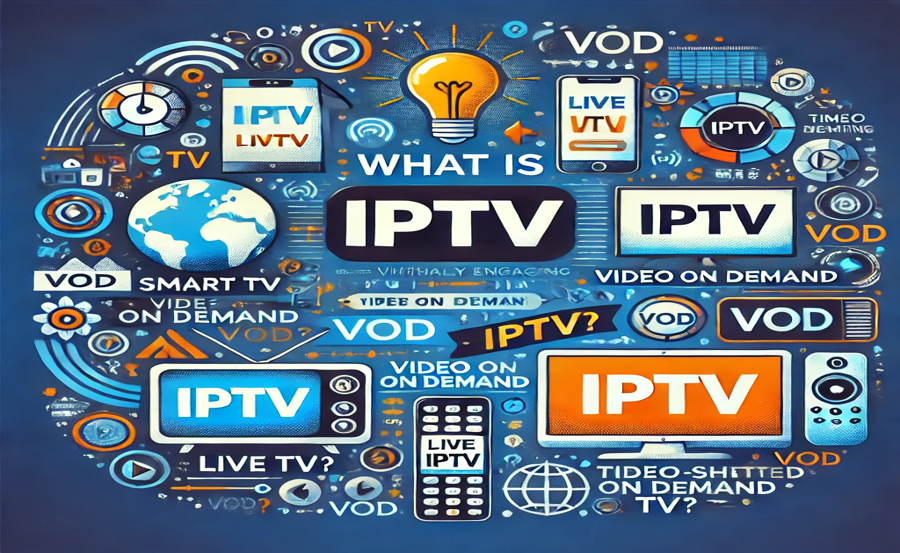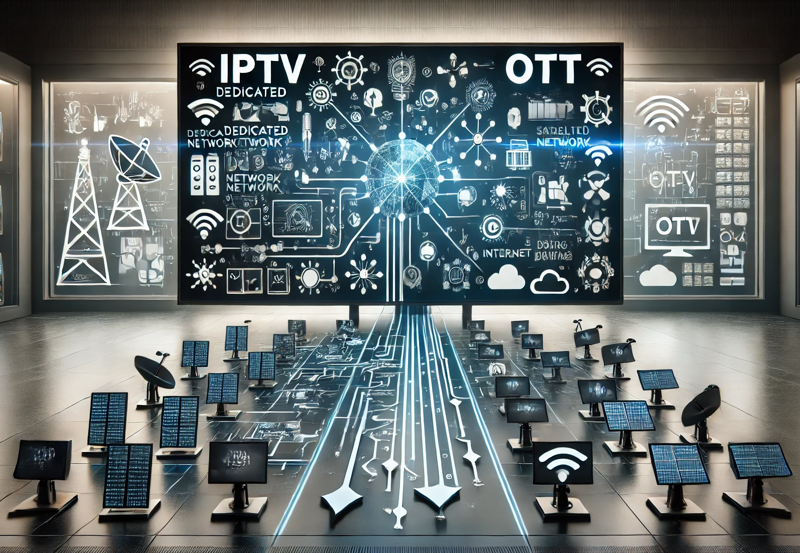IPTV (Internet Protocol Television) is a modern method of delivering television content over the internet, offering an alternative to traditional cable or satellite TV. IPTV allows users to access live TV channels, on-demand content, and recorded shows through an internet connection, making it highly flexible and convenient.
In this beginner’s guide, we’ll explore what IPTV is, the different types of IPTV services, its benefits, and how to get started.
What is IPTV?
IPTV stands for Internet Protocol Television, a system that uses internet networks to transmit TV programs and videos. Unlike traditional TV, where content is delivered via cable or satellite, IPTV allows you to stream content directly over the internet. This gives you the freedom to choose what you want to watch and when, providing a more customized viewing experience.
How IPTV Works
IPTV transmits video content using IP (Internet Protocol) technology. Content is delivered in data packets over a network, allowing viewers to access it in real-time or on-demand. IPTV services typically offer apps or set-top boxes that allow access to content on a variety of devices, such as smart TVs, computers, tablets, and smartphones.
Types of IPTV Services
IPTV offers a range of options to meet different viewing preferences. The main types include:
1. Video on Demand (VOD)
VOD gives viewers access to a library of movies, series, and shows that can be watched at any time. Popular streaming services like Netflix, Hulu, and Amazon Prime Video operate in a similar way, providing content on demand through IPTV technology.
2. Live Television
Live TV on IPTV allows users to watch live broadcasts, such as news, sports, and events, over the internet in real time. This is similar to watching live channels on traditional TV, but through an internet connection instead.
3. Time-Shifted TV (Catch-Up TV)
Time-shifted TV allows users to watch content that was broadcast earlier, enabling them to catch up on shows they missed. This is especially useful for news, sports, or shows that viewers may want to watch after the initial broadcast.
4. TV on Demand
TV on Demand is a feature that lets viewers pause, rewind, or fast-forward through live programming. Some IPTV services include this feature on select channels, giving users greater control over their viewing experience.
How is IPTV Different from Traditional TV?
| Feature | IPTV | Traditional TV |
|---|---|---|
| Delivery Method | Over the internet | Cable, satellite, or antenna |
| Content Selection | On-demand and live options | Scheduled broadcasts |
| Device Compatibility | Multiple devices (TV, phone, tablet) | Limited to cable/satellite setup |
| Interactive Features | Pause, rewind, VOD | Limited to basic channel switching |
| Availability | Accessible worldwide | Region-restricted |
| Setup | App-based or set-top box | Requires cable or satellite setup |
Benefits of IPTV
1. Flexibility and Convenience
IPTV offers the flexibility to watch content on various devices, including smartphones, tablets, computers, and smart TVs. This means you can access your favorite shows and movies from virtually anywhere with an internet connection.
2. Customizable Content
With IPTV, you can often select packages that suit your interests. Many IPTV providers offer customizable channel packages, allowing you to choose the content that best fits your viewing habits.
3. Enhanced Features
IPTV provides interactive features like time-shifting, VOD, and catch-up TV. These features allow viewers to pause, rewind, and watch content on their schedule, creating a more personalized experience.
4. Access to Global Content
IPTV offers access to channels and shows from around the world. If you’re interested in exploring international programming, IPTV provides a wider selection than most cable or satellite services.
5. Cost-Effective
IPTV is often more affordable than traditional cable or satellite TV, with flexible subscription plans. Since it uses an existing internet connection, there are no installation fees for additional cables or equipment.
What You Need to Get Started with IPTV
To start watching IPTV, you’ll need a few essentials:
1. Reliable Internet Connection
A stable internet connection is crucial for a smooth IPTV experience. For HD streaming, speeds of at least 10 Mbps are recommended, while 4K streaming may require speeds of 25 Mbps or higher.
2. IPTV Subscription
Choose an IPTV provider with a package that matches your preferences. Some providers offer trial periods so you can test their service before committing.
3. Compatible Device
IPTV can be accessed on multiple devices, including smart TVs, smartphones, tablets, and computers. Many IPTV providers have apps that are compatible with popular devices, so check the compatibility before subscribing.
How to Choose an IPTV Provider
When choosing an IPTV provider, consider the following:
- Content Selection: Look for providers that offer the channels, shows, and on-demand content that match your interests. Buy 6 Months IPTv subscription
- Reliability and Stability: Select a provider with good user reviews, uptime, and customer service to avoid interruptions.
- Device Compatibility: Ensure the provider’s app works with your preferred devices.
- Cost and Subscription Options: Compare pricing plans and trial periods to find a service that fits your budget.
Is IPTV Right for You?
IPTV is ideal for viewers who want the flexibility to watch live and on-demand content on various devices. It’s a great choice if you’re interested in customizable packages, global content, and enhanced viewing features like time-shifting and catch-up TV. However, IPTV requires a stable internet connection, so it may not be the best option in areas with limited or unreliable internet access.
Conclusion
IPTV is transforming the way we watch television by providing flexible, on-demand content that can be accessed from anywhere. From live broadcasts to on-demand movies and interactive features, IPTV offers a range of services that can enhance your entertainment experience. By understanding the basics of IPTV and how it differs from traditional TV, you can make an informed decision about whether it’s the right choice for your home entertainment setup.
Choosing the Right IPTV Subscription Plan for Your Needs





